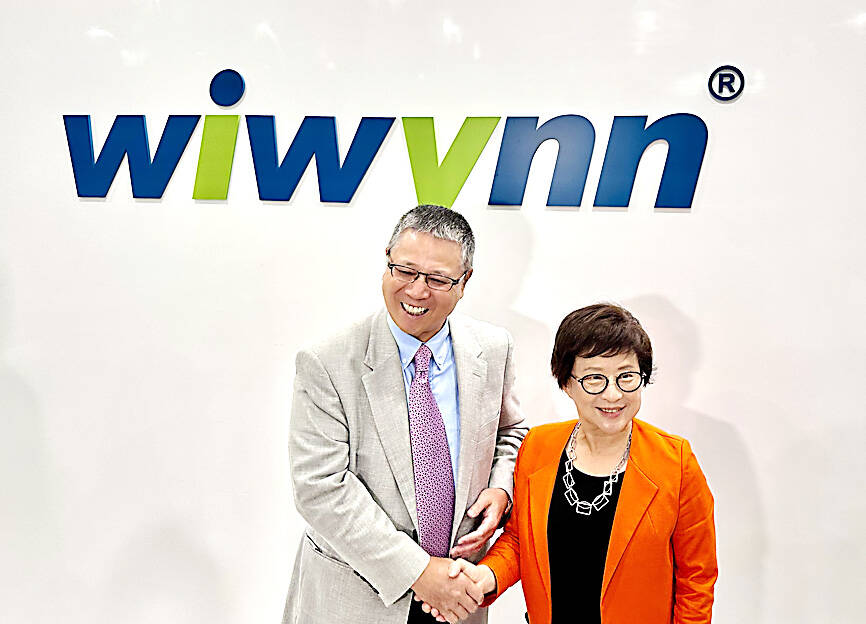Shares of cloud computing equipment supplier Wiwynn Corp (緯穎科技) yesterday rose more than 5 percent, bucking the broader market’s downturn as investors remain confident about the company’s business prospects.
Wiwynn, which makes cloud-based servers and hyperscale data centers, on Monday reported earnings per share (EPS) of NT$14.96 for the second quarter, a fall of 30.67 percent from the previous quarter and down 26.55 percent from a year earlier.
However, the company’s EPS for the first half of the year reached NT$33.82, higher than the NT$33.79 it posed for the same period last year. It was also its best performance for the period in the company’s history.

Photo: Fang Wei-chieh, Taipei Times
Analysts surveyed by financial data firm FactSet expect Wiwynn to report EPS of NT$66.14 to NT$82.06 for this year, with a median estimate of NT$71.76.
Wiwynn shares closed up 5.41 percent, while the TAIEX retreated 0.7 percent.
Its server clients are mostly large data center operators and it is also an artificial intelligence (AI) server system integrator for US cloud service providers (CSPs) such as Meta Platforms Inc, Microsoft Corp and Amazon.com Inc, competing mainly with Quanta Computer Inc (廣達), analysts have said.
“This year is challenging in light of global inflation and interest rate hikes, which are factors not conducive to enterprise purchases,” Wiwynn chief financial officer Harry Chen (陳昌偉) told an online investors’ conference yesterday.
“CSPs last year showed intentions to adjust downward their capital expenditures and they are gradually implementing their plans this year,” he added.
Chen said that prospects for next year depend on inflation and the supply-demand balance in the second half of this year.
However, the company would have greater exposure to AI servers next year, after shipping limited, tailor-made AI models this year, he added.
Regarding market speculation that the company might gain orders from the Middle East for servers using immersion cooling technology, Chen declined to comment, saying only that it hopes to optimize its customer structure and would engage with clients whenever opportunities emerge.
Yuanta Securities Investment Consulting Co (元大投顧) forecast that Wiwynn would ship 2,000 AI servers this year, increasing to 25,000 units next year and 46,000 units in 2025.
As the average selling price of AI servers is much higher than for traditional servers, they would contribute significantly to Wiwynn’s revenue in the next two years, Yuanta Securities Investment Consulting said in a note.
Consolidated revenue in the April-to-June quarter fell 25 percent from a year earlier to NT$56.31 billion (US$1.77 billion), while net profit fell 26.6 percent to NT$2.62 billion from NT$3.56 billion a year earlier, Wiwynn reported on Monday.
Gross margin last quarter increased 0.5 percentage points to 8.8 percent, while operating margin grew 0.1 percentage points to 6.2 percent due to better cost controls, the company said.
In the first half of the year, cumulative revenue grew 2.8 percent year-on-year to NT$130.53 billion and net profit rose 0.1 percent to NT$5.91 billion, with gross margin and operating margin improving to 8.5 percent and 6.1 percent respectively, it said.

Intel Corp chief executive officer Lip-Bu Tan (陳立武) is expected to meet with Taiwanese suppliers next month in conjunction with the opening of the Computex Taipei trade show, supply chain sources said on Monday. The visit, the first for Tan to Taiwan since assuming his new post last month, would be aimed at enhancing Intel’s ties with suppliers in Taiwan as he attempts to help turn around the struggling US chipmaker, the sources said. Tan is to hold a banquet to celebrate Intel’s 40-year presence in Taiwan before Computex opens on May 20 and invite dozens of Taiwanese suppliers to exchange views

Application-specific integrated circuit designer Faraday Technology Corp (智原) yesterday said that although revenue this quarter would decline 30 percent from last quarter, it retained its full-year forecast of revenue growth of 100 percent. The company attributed the quarterly drop to a slowdown in customers’ production of chips using Faraday’s advanced packaging technology. The company is still confident about its revenue growth this year, given its strong “design-win” — or the projects it won to help customers design their chips, Faraday president Steve Wang (王國雍) told an online earnings conference. “The design-win this year is better than we expected. We believe we will win

Chizuko Kimura has become the first female sushi chef in the world to win a Michelin star, fulfilling a promise she made to her dying husband to continue his legacy. The 54-year-old Japanese chef regained the Michelin star her late husband, Shunei Kimura, won three years ago for their Sushi Shunei restaurant in Paris. For Shunei Kimura, the star was a dream come true. However, the joy was short-lived. He died from cancer just three months later in June 2022. He was 65. The following year, the restaurant in the heart of Montmartre lost its star rating. Chizuko Kimura insisted that the new star is still down

While China’s leaders use their economic and political might to fight US President Donald Trump’s trade war “to the end,” its army of social media soldiers are embarking on a more humorous campaign online. Trump’s tariff blitz has seen Washington and Beijing impose eye-watering duties on imports from the other, fanning a standoff between the economic superpowers that has sparked global recession fears and sent markets into a tailspin. Trump says his policy is a response to years of being “ripped off” by other countries and aims to bring manufacturing to the US, forcing companies to employ US workers. However, China’s online warriors